Press

by Jamie Marshall
Greenwich Magazine
Paying Attention
Old Greenwich resident Nancy Armstrong knows how debilitating Attention Deficit/Hyperactivity Disorder can be. She is the mother of three children—a boy and two girls—each of whom received an ADHD diagnosis as adolescents. (Her husband Tim, CEO of Flowcode and former CEO of AOL, was also diagnosed in the process.) At the time, there was very little public discussion about the disorder, which lived in the shadows, shrouded by shame, blame and misunderstanding.
With the release of her first feature-length film, The Disruptors, the Emmy-nominated producer sets out to destigmatize ADHD, a neurological disorder that affects nearly 10 percent of adolescents in the U.S. (and a rising number of adults). [read more]
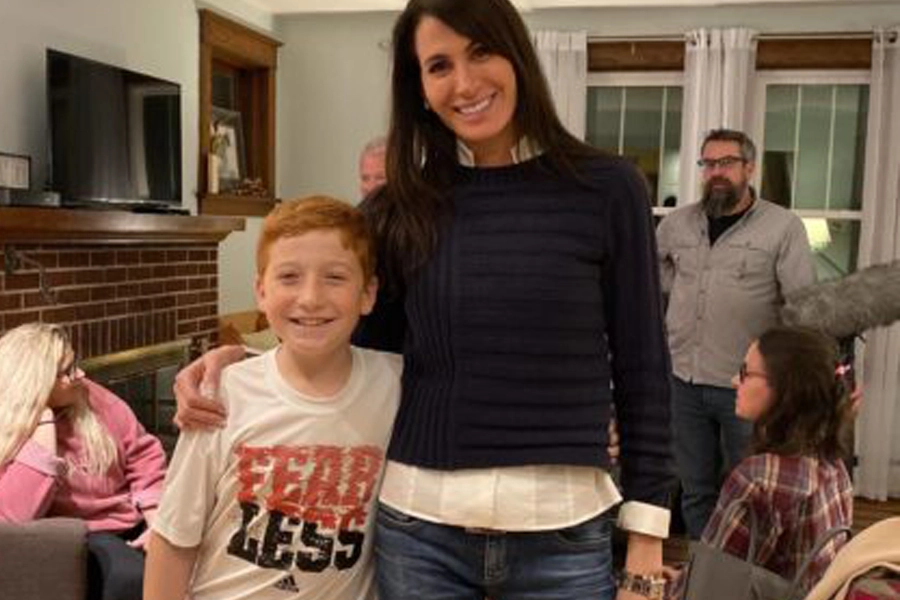
by Anne Semmes
Greenwich Sentinel
Nancy Armstrong’s “The Disruptors” film shines positive light on kids with ADHD
Nancy Armstrong has raised three children with her husband Tim Armstrong in Riverside. They’ve been blessed as a family in many ways but have had challenges, with their oldest son, struggling in school with ADHD, that attention deficit/hyperactivity disorder. “We worried a lot about my son,” she tells, “Because it’s a herculean struggle that requires an insane amount of patience. Every single day is Groundhog Day. Every day goes badly. Even if you are employing all the tools in the toolbox, it’s still a struggle.”
Mother Armstrong recalls that day her son, age eight, was diagnosed with ADHD at the Greenwich diagnostician’s office. “He’s rattling off the symptoms of ADHD. My husband is sitting in the chair…slinking down and his hand is going up. He says, ‘I have all those symptoms.” ADHD is hereditary. And then the Armstrong’s’ two younger daughters reach puberty with the older daughter showing inattentiveness. “No hyperactivity, no impulsivity, she just suffers quietly in the back of the classroom.” Both girls test positive for ADHD. [read more]
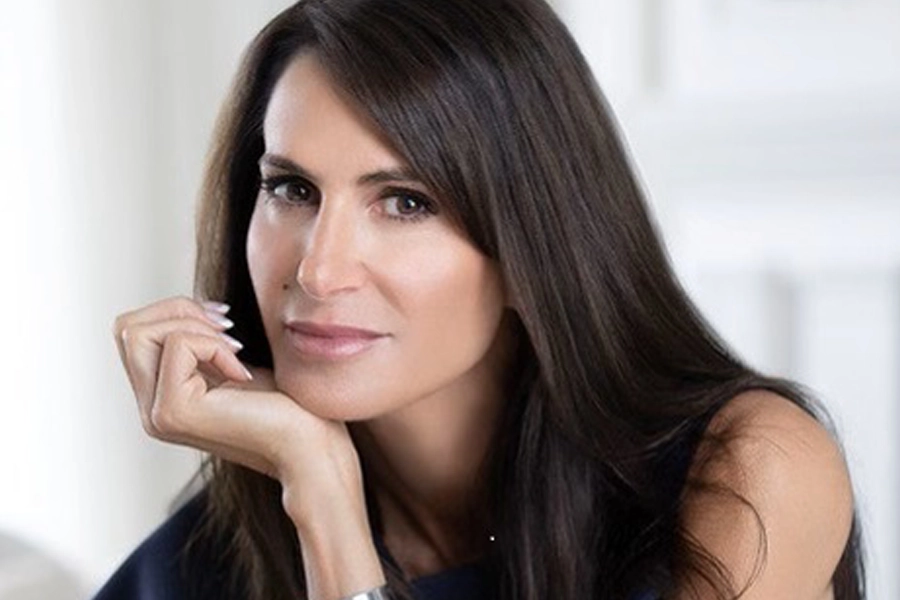
by Kennedy Munster
Haute Living
“The Disruptors” Star-Studded Documentary Puts A Positive Spin On ADHD
Lazy. Careless. Forgetful. These are just a few misconceptions that people who suffer from ADHD get unrightfully labeled as when in fact, it’s the complete opposite. Dedicated to ADHD Awareness, the new compelling film, The Disruptors, proves this. Premiering right on time during the ADHD awareness month of October, we recognize and celebrate the 7 million US children and 23 million adults affected by ADHD.
It is all thanks to Emmy-nominated producer and Executive Producer at Happy Warrior Media, Nancy Armstrong, who shed light on the struggles and misunderstandings of ADHD. As a philanthropist, mother of three, wife to well-known executive, Tim Armstrong, and producer of this star-studded film, Nancy is about to change lives and perceptions around the world. [read more]

WGN News
‘The Disruptors’: First comprehensive documentary film on ADHD
Award-winning film THE DISRUPTORS is the first definitive, comprehensive documentary film on ADHD that debunks harmful myths. The film features Paris Hilton, will.i.am, Terry Bradshaw, along with the world`s leading experts on ADHD, and follows five American families living with ADHD. [watch video]
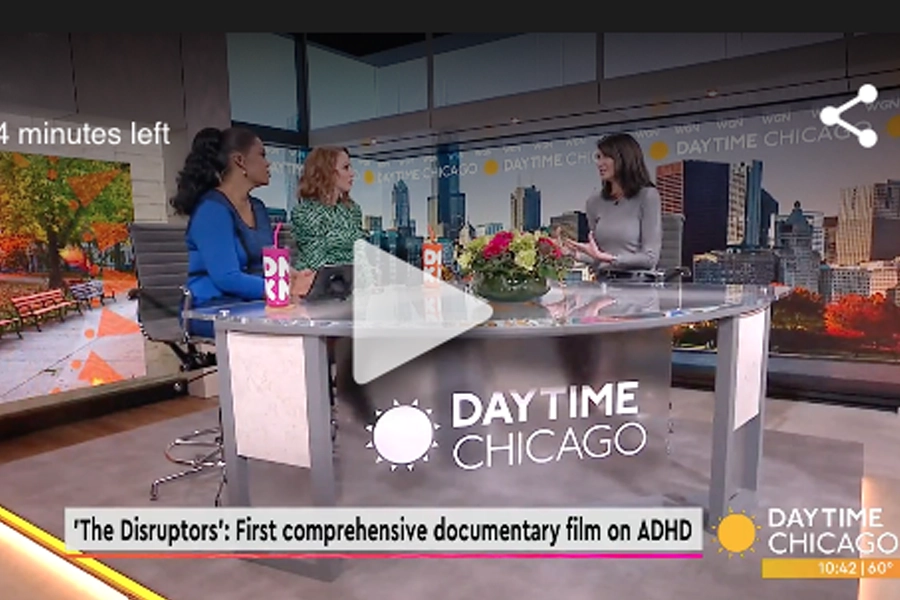
by Amy Rutledge, Tonya Francisco
Daytime Chicago
‘The Disruptors’: First comprehensive documentary film on ADHD
The Disruptors features Paris Hilton, Will.I.Am, Terry Bradshaw, along with the world’s leading experts on ADHD, and follows five American families living with ADHD in efforts to shed light on the condition and dispel the many myths about ADHD. Joining us now with more is Emmy-award winning producer Nancy Armstrong. [watch video]

by PR
Hamlethub
Emmy-nominated producer and Greenwich resident Nancy Armstrong creates documentary film on ADHD, The Disruptors
The first thing Nancy Armstrong wants you to know about attention deficit hyperactivity disorder (ADHD): It can be a superpower.
“People with ADHD tend to be our most creative people. They are our entrepreneurs, our inventors, our Olympians, our CEOs, our artists, our risk-takers,” says Armstrong, who is executive producer of a new documentary about ADHD called The Disruptors, available for streaming online at Apple TV, Google Play, and Vudu TV on May 12. “If we properly diagnosed every kid and provided the support they needed to manage the condition, just think about how much further we could get as a society,” says Armstrong.
But the reality is for those living through it day-to-day, the disorder is a struggle. Marked by hyperactivity, impulsivity, and attention problems, ADHD is one of the most commonly diagnosed neurodevelopmental disorders in children, and it’s on the rise, now affecting one in 10 children and adolescents in the United States—including all three of Armstrong’s kids, now ages 16 to 20. (ADHD can be hereditary, and it often runs in families.) [read more]

by Robert Cocuzzo
Nantucket Magazine
Nantucket summer resident Nancy Armstrong’s groundbreaking documentary on ADHD.
What do astronaut Scott Kelly, socialite Paris Hilton, Olympic swimmer Michael Phelps, shoe designer Steve Madden, political pundit Glenn Beck, fitness guru Jillian Michaels and JetBlue founder David Neeleman all have in common? They all have attention-deficit/hyperactivity disorder, commonly known as ADHD. And they’re not the only ones. Studies show that nearly 10 percent of American children have ADHD, making it the most common pediatric diagnosis in the country.
While the numbers appear to be increasing, ADHD is not a new phenomenon. Looking back in history, researchers believe that it’s highly likely that well-known figures like Benjamin Franklin and Albert Einstein had ADHD. Despite its growing prevalence and historic precedence, many still believe ADHD to be a fake diagnosis. Some teachers dub it as an excuse for laziness, poor parenting or a general lack of intelligence. Nantucket summer resident Nancy Armstrong is out to change all that with a compelling documentary titled The Disruptors. [read more]
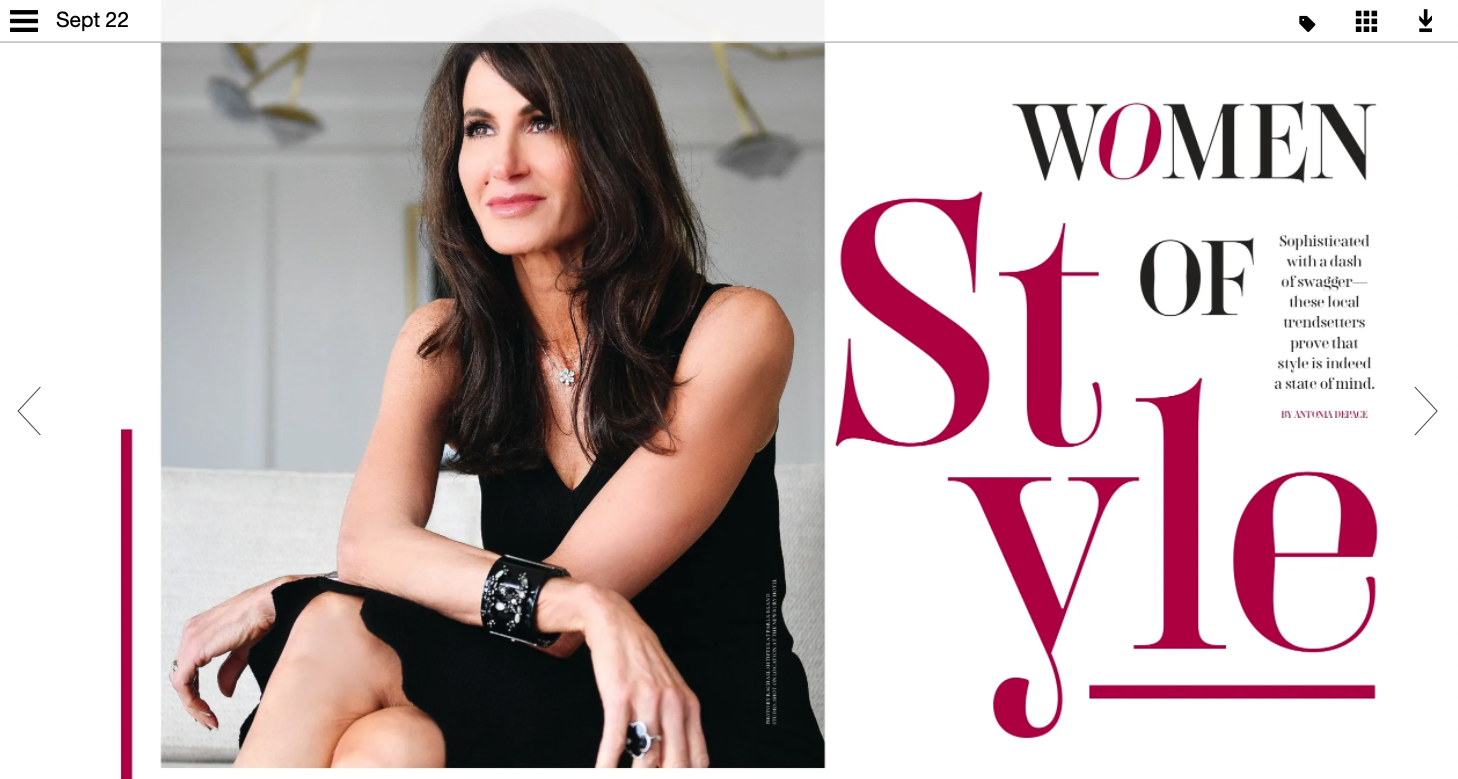
by Robert Cocuzzo
Boston Commons
Nancy Armstrong
When Nancy Armstrong’s son was diagnosed with ADHD the Boston Universtiy alumna felt as if she didn’t have anything to guide her. And she wasn’t the only one–of note, 7 million children are affeced by ADHD, as well as 23 million adults, in the United States. But to every problem, there is a solution, and Armstrong found hers within her most recent Documentary, The Disruptors. [read more]
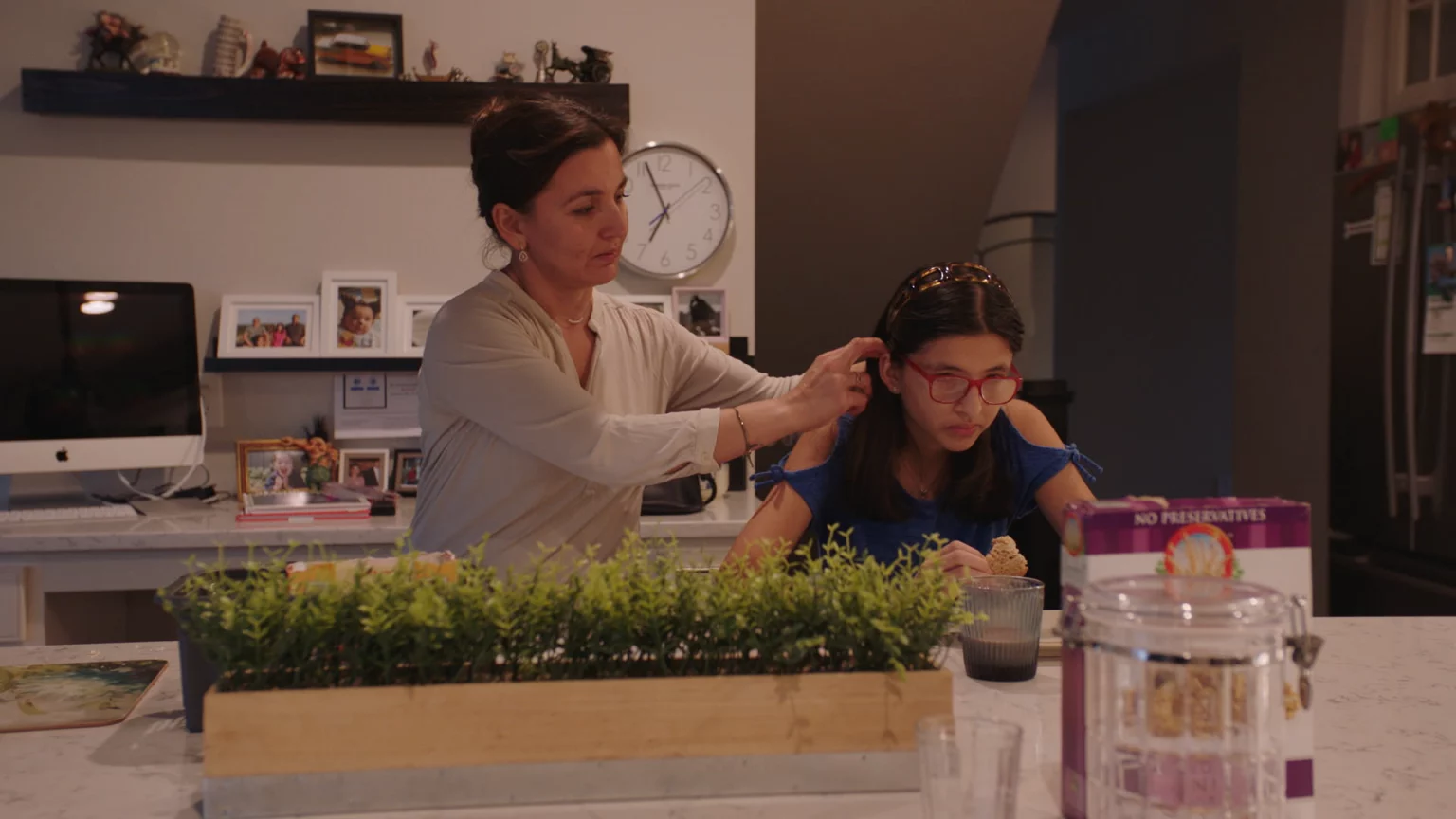
by Jessica Migala
OprahDaily.com
Nancy Armstrong Is Changing the Conversation Around ADHD with New Documentary The Disruptors
The first thing Nancy Armstrong wants you to know about attention deficit hyperactivity disorder (ADHD): It can be a superpower.
“People with ADHD tend to be our most creative people. They are our entrepreneurs, our inventors, our Olympians, our CEOs, our artists, our risk-takers,” says Armstrong, who is executive producer of a new documentary about ADHD called The Disruptors, available for streaming online at Apple TV, Google Play, and Vudu TV on May 12. “If we properly diagnosed every kid and provided the support they needed to manage the condition, just think about how much further we could get as a society,” says Armstrong.
But the reality is for those living through it day-to-day, the disorder is a struggle. Marked by hyperactivity, impulsivity, and attention problems, ADHD is one of the most commonly diagnosed neurodevelopmental disorders in children, and it’s on the rise, now affecting one in 10 children and adolescents in the United States—including all three of Armstrong’s kids, now ages 16 to 20. (ADHD can be hereditary, and it often runs in families.) [read more]

CBS News
New documentary aims to educate, reframe view of ADHD

TMZ
Having ‘ADHD’ can be an asset
Nancy Armstrong is changing the narrative about ADHD in a new documentary … telling us the disorder can actually be a secret power.

MSN
Paris Hilton, will.i.am among celebrities in Greenwich producer’s doc on ADHD
According to the Centers for Disease Control, it is estimated that 9.4 percent of children have been diagnosed with attention-deficit/hyperactivity disorder. The chronic condition, most commonly known as ADHD, is often characterized by persistent patterns of inattention, hyperactivity and impulsivity.
While an ADHD diagnosis may be perceived negatively by some families, one Greenwich parent is hoping to change the perception of ADHD with a star-studded documentary. [read more]
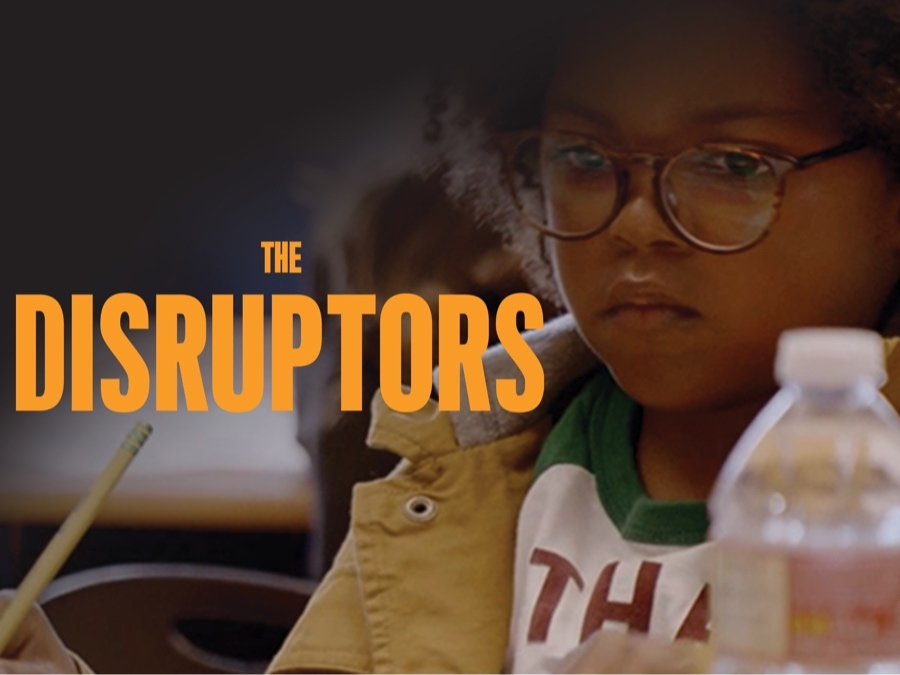
by Richard Kaufman
Patch
GREENWICH, CT — Attention-deficit/hyperactivity disorder (ADHD) is one of the most commonly diagnosed and widely misunderstood neurological conditions in the world.
One Greenwich resident is hoping to shed light on the disorder, and end the stigma associated with it.
“The Disruptors,” a first-of-its-kind, comprehensive documentary about ADHD which came out in 2021, was released on Apple TV/iTunes, Vudu TVOD and Google Play last week. [read more]
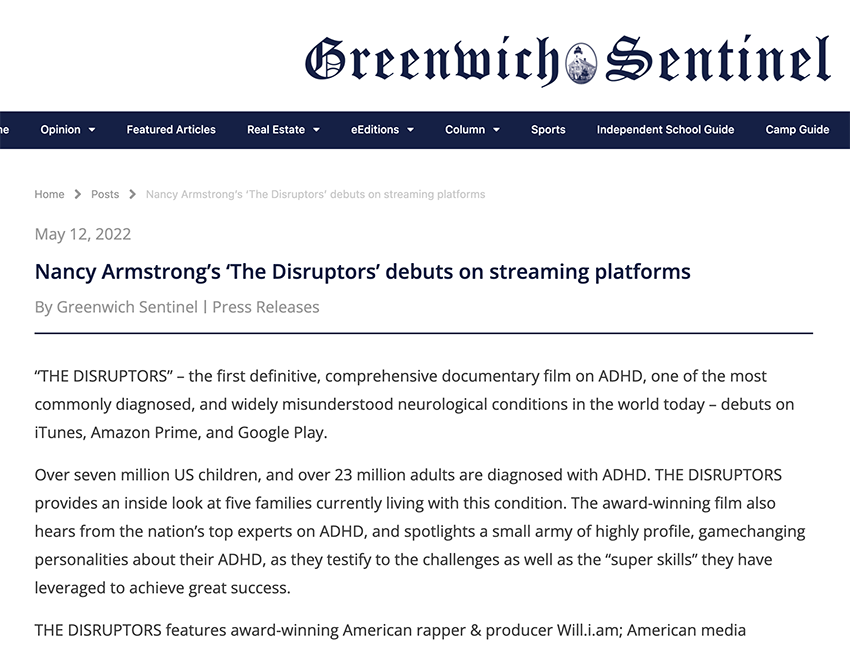
by Greenwich Sentinal
Greenwich Sentinal
Nancy Armstrong’s ‘The Disruptors’ debuts on streaming platforms
“THE DISRUPTORS” – the first definitive, comprehensive documentary film on ADHD, one of the most commonly diagnosed, and widely misunderstood neurological conditions in the world today – debuts on iTunes, Amazon Prime, and Google Play.
Over seven million US children, and over 23 million adults are diagnosed with ADHD. THE DISRUPTORS provides an inside look at five families currently living with this condition. The award-winning film also hears from the nation’s top experts on ADHD, and spotlights a small army of highly profile, gamechanging personalities about their ADHD, as they testify to the challenges as well as the “super skills” they have leveraged to achieve great success.
[read more]
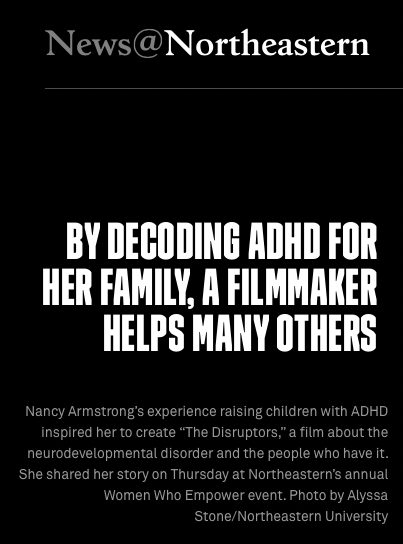
by Molly Callahan
News@Northeastern
Nancy Armstrong’s experience raising children with ADHD inspired her to create “The Disruptors,” a film about the neurodevelopmental disorder and the people who have it. She shared her story on Thursday at Northeastern’s annual Women Who Empower event.
For Nancy Armstrong, raising children felt lonely sometimes, like her family was on an island that no one could reach. She and her husband struggled to help their oldest son, Jack, focus at school. Later his two younger sisters seemed to have trouble, too.
Eventually, Jack received a diagnosis that would change his—and his mom’s—life. Doctors determined that he had attention deficit/hyperactivity disorder, better known as ADHD. It explained his sometimes scattered, other times laser-focused attention, and his proclivity for constant motion. And it planted a seed in Nancy Armstrong’s mind that would bear fruit years later.
“The diagnosis opened the door for us,” she told the packed crowd at an event hosted by organizers of Northeastern’s Women Who Empower initiative. “We felt for so long that we were alone, but at least now we knew what we were dealing with.”
The experience—from getting kicked out of a mommy-and-me class when Jack was a toddler, to discovering how often people with ADHD are simply dismissed as “disruptive” or “trouble-making”—inspired Armstrong to do something. So, she created “The Disruptors,” a film about ADHD and the people who have it, including entrepreneur Paris Hilton, musician will.i.am, astronaut Scott Kelly, and comedian Howie Mandel.
Armstrong, whose company, Happy Warrior Media, produced the film, also served as its executive producer. “The Disruptors” screened at a number of film festivals and won the audience choice award at the San Diego International Film Festival this year. It will be released to the public in early 2022.
On Thursday, Armstrong joined Diane MacGillivray, senior vice president for university advancement, in a conversation about the film and her own journey of discovery about ADHD.
The neurodevelopmental disorder is one of the most common among children, and it often lasts through adulthood, according to the U.S. Centers for Disease Control and Prevention. And yet, as Armstrong and several audience members attested at the Women Who Empower event, the disorder can easily be misread by teachers and other educators as simple distractedness or excess energy.
“If you’re a child with ADHD, or you have a child with ADHD, all you’re told is that you’re disruptive. With this film, we wanted to turn the idea of being ‘disruptive’ from a negative trait to a positive one,” Armstrong said, noting that the term is already used glowingly to describe tech innovators as who “disrupt” the status quo.
Indeed, many of the qualities associated with ADHD can be understood as positive traits, Armstrong said. Ned Hallowell, a child and adult psychiatrist featured in the film, reframed several so-called negative traits such as hyperactivity and impulsivity as energy and creativity in a clip shown at Thursday’s event.
As for Jack? He’s studying business management at Northeastern and seeking out new and innovative solutions to some of the world’s big problems. In January, while strict density-mitigation and physical distancing measures were in place across the U.S., he created a set of QR codes to post around Northeastern’s Boston campus and help people connect with one another, virtually.
Armstrong’s work to destigmatize and spread awareness of ADHD clearly resonated with people in the Women Who Empower audience, many of whom shared their own experiences with the disorder and thanked Armstrong for her passion. Asked by one audience member about her legacy, Armstrong pointed back to the viewers of the film.
“To the extent that I think about my legacy, I only really think about it in terms of what I can do that’s useful, that’s helpful,” she said. “I wanted something positive that would help other people. I felt like someone had to make the film, and I guess that person had to be me.”
On Thursday, Armstrong joined a growing number of entrepreneurs, innovators, movers, and shakers in the Women Who Empower network, including 19 women who were part of the inaugural class of Innovator Award winners. The award recognized women who were current students or graduates of Northeastern whose ventures received funding to help push them forward. Northeastern’s Women Who Empower inclusion and entrepreneurship initiative distributed a total of $100,000 in grants to help fund 17 ventures. Applications for the next round of funding will open in January 2022.
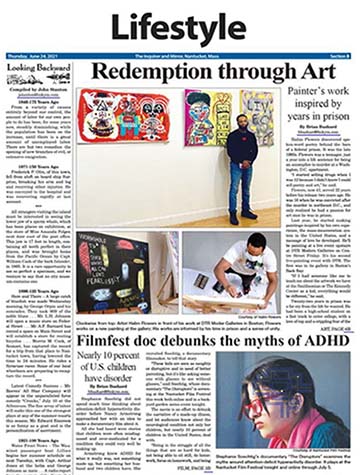
By Brian Bushard
The Inquirer and Mirror
Filmfest Doc Debunks the Myths of ADHD
Stephanie Soechtig did not spend much time thinking about attention-deficit hyperactivity disorder before Nancy Armstrong approached her with an idea to make a documentary film about it.
All she had heard were stories that children were often misdiagnosed and over-medicated for a condition they could very well be making up. Armstrong knew ADHD for what it really was, not something made up, but something her husband and two children have. She recruited Soechtig, a documentary filmmaker, to tell that story.
“These kids are seen as naughty or disruptive and in need of better parenting, but it’s like asking someone with glasses to see without glasses,” said Soechtig, whose documentary “The Disruptors” is screening at the Nantucket Film Festival this week both online and in a backyard garden series event tonight.
The movie is an effort to debunk the narrative of a made-up illness, and let audiences know about the neurological condition not only her children, but nearly 10 percent of children in the United States, deal with.
“Being in the struggle of all the things that are so hard for kids, not being able to sit still, do homework, focus on homework, and being FILM, PAGE 3B
Stephanie Soechtig’s documentary “The Disruptors” examines the myths around attention-deficit hyperactivity disorder. It plays at the Nantucket Film Festival tonight and online through July 5.
Courtesy of Nantucket Film Festival
Film: Festival’s “The Disruptors” aims to debunk the myths of ADHD (Continued from page 1B)
labeled a bad kid who can’t listen or a bad parent who can’t control their child and how frustrating that was, there’s no film you could turn to for inspiration or strength or feel empowered on what to do,” Armstrong said.
Armstrong has seen ADHD’s effects first-hand with her children. Several years their diagnosis, her husband, Flowcode CEO and former AOL and Yahoo! CEO Tim Armstrong, was also diagnosed with the disorder.
Approximately 9.4 percent of children in the U.S. are diagnosed with ADHD, according to a 2016 survey from the Journal of Clinical Child and Adolescent Psychology. It revealed an increase in diagnoses across the board from preschool to high-school students over the past few decades.
But despite its prevalence, there is still a stigma around ADHD that can be debilitating for children trying to understand what’s wrong with them when their parents or teachers don’t understand the neurological effects themselves. Armstrong knew how hard it was on parents, first-hand.
In order to address it, she reached out to other celebrities who experience the same symptoms themselves, like the inability to focus, impulsiveness, low self-esteem and hyperactivity.
Comedians, athletes, actors and musicians all spoke up about it in the documentary: will.i.am, Howie Mandel, Terry Bradshaw, Jillian Michaels, Glenn Beck.
“We wanted to have as many role-models as possible,” Armstrong said. “If you’re a kid that thinks you’re never going to amount to anything, it’s powerful.”
Often, she said, those people are seen as outliers who can break the mold of ADHD to become successful. But they will tell you there are not only challenges with ADHD, but strengths that come with an ADHD brain that can also let you be more creative.
The idea is to not only give children a sense of hope, but to provide parents, teachers and coaches with a toolkit they can use to help their kids if they’re showing signs of ADHD.
“People aren’t aware of the strength-based approach. Until we educate people about ADHD, we are damaging kids as they go through K-12,” Armstrong said.
“Parents in this film are doing well and falling down. We’re all human. I don’t have Herculean patience. It’s a growth journey for the parents as well as the kids.”
Armstrong is worried that without the knowledge of how to treat the disorder, children with ADHD will simply be labeled as “bad kids.” What starts with school detentions and a struggle to make friends, could turn into years of increased risk of substance use, poor social skills and job rejections, she said.
Soechtig wants people to start thinking about ADHD beyond the initial struggle. There’s more to it than that. She wants people to also see the creativity associated with it as an asset that can be encouraged.
“The symptoms present themselves as something you can will yourself to control rather than a neurological condition,” she said.
“When I started digging into the science and studies, this notion that kids are over-medicated and over- diagnosed is more hype than substance. Taking away this stigma that comes along with things that are neurological is a real sea change that needs to happen.”
“The Disruptors” screens at 8 p.m. tonight as part of the Nantucket Film Festival’s garden series. Tickets are wait-list only. The film is also playing online through July 5 with the purchase of a streaming pass. For tickets and more information, visit nantucketfilmfestival.org.
